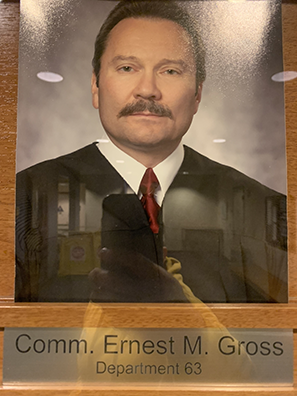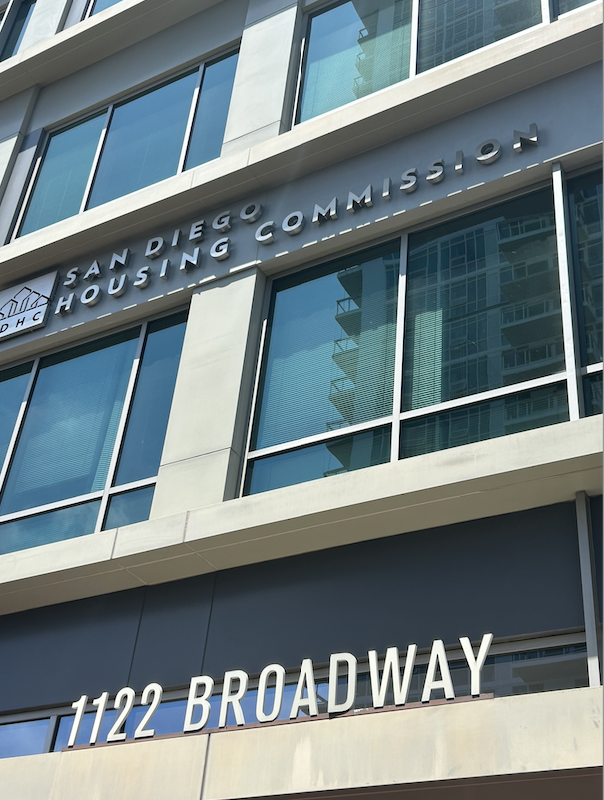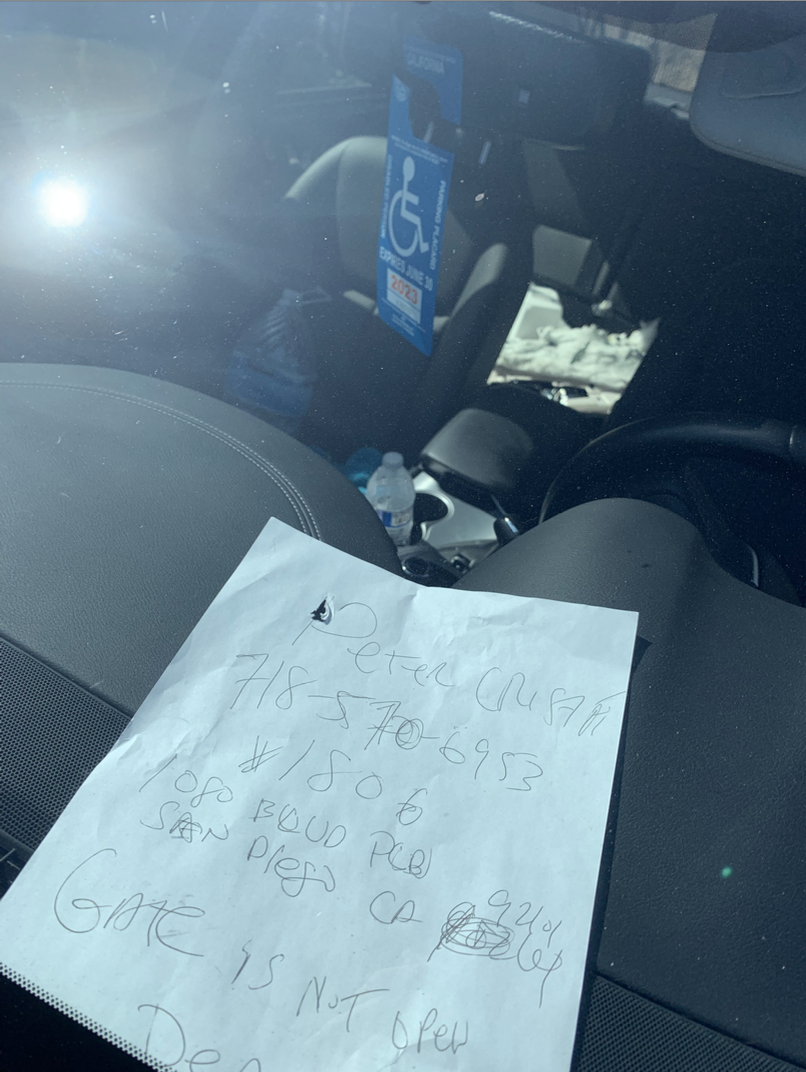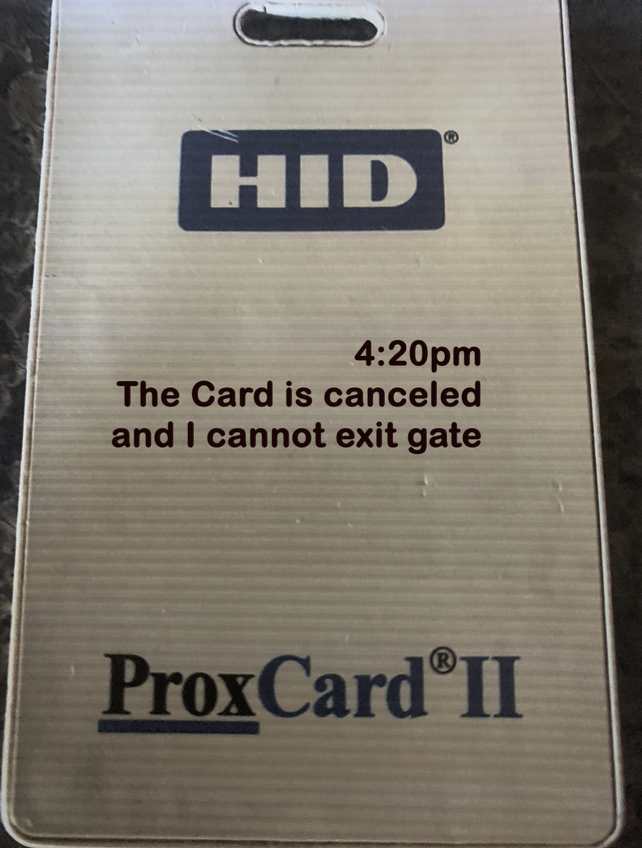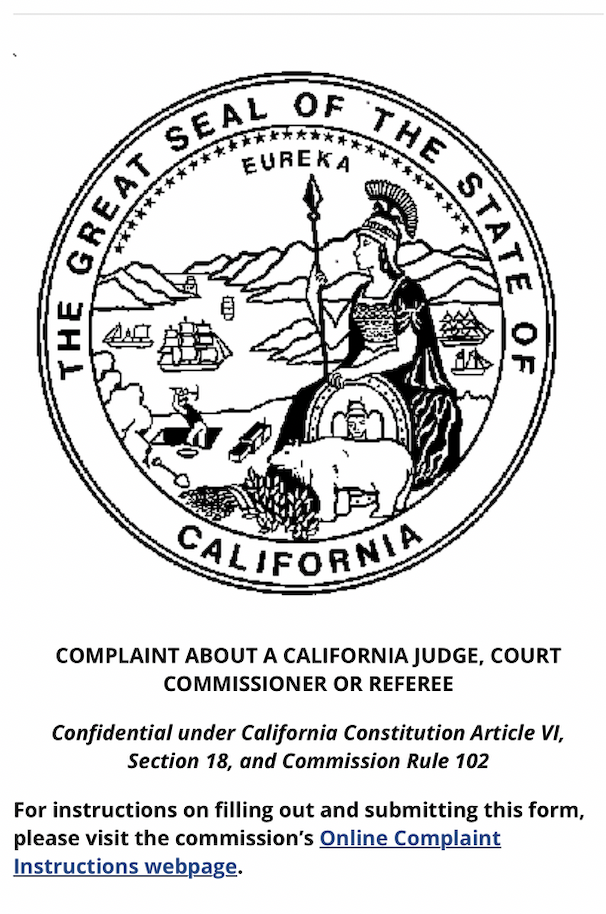HARASSMENT HANDICAPPED PARKING, And FAIR HOUSING SMALL SUIT
NOVEMBER /16/2022
CASE NUMBER 22SC00127C
Dept. 63
TRIAL: COMMISSIONER Ernest M, Gross
PLAINTIFF: PETER CRISAFI VS DEFENDANT: SMART CORNER OWNERS INC, AND ACE PARKING INC.
CLAIM: UNLAWFULLY TOWED HANDICAPPED CAR AND HARASSMENT HANDICAPPED PARKING Disability, or handicap, parking permits
If harassment occurs, individuals can choose to ignore it, knowing that the person harassing lacks understanding.
MANAGEMENT ACE PARKING FOR SMART CORNER OWNER INC. AND The San Diego Housing Commission (SDHC)
PARKING FOB OPEN ELEVATOR SMART CORNER OWNER 1080 PARKING BLVD SAN DIEGO CA 92101 AND The San Diego Housing Commission (SDHC) 1122 Broadway UNIT 300, San Diego, CA 92101. THIS PARKING GARAGE IS CLOSED TO THE PUBLIC
My apartment lease is 3 yr rent at 1080 Park Blvd apt 1806 Smart Corner Association Inc.
MANAGEMENT ACE PARKING FOR SMART CORNER OWNER INC. AND The San Diego Housing Commission (SDHC)
PARKING FOB OPEN ELEVATOR SMART CORNER OWNER 1080 PARKING BLVD SAN DIEGO CA 92101 AND The San Diego Housing Commission (SDHC) 1122 Broadway UNIT 300, San Diego, CA 92101. THIS PARKING GARAGE IS CLOSED TO THE PUBLIC
May 17, 2022, talking to Steven K. Ramsey/Manager of Smart Corner Parking Garage. I have ADA handicap and harassment, stroke, and bully parking. He and a woman's name towed my car, C.V.C 22658A, and handicapped parking. I live in a building with an authorized parking lot.
Steven K. Ramsey harassment “ You cannot read? Parking street, my card parking, you are rented.
San Diego Housing Commission Woman I don’t name, and three security officers towed my car in handicapped 30 minutes because we were talking to the building manager. It’s an unlawfully disabled resident and the law.
May 18, 2022, morning talking Steven K. Ramsey/Manager Smart Corner Parking Garage has harassed, scolded, rebuked, and bullied me for parking tow my car. Steven K. Ramsey/Manager Smart Corner Parking Garage. They don't have handicapped parking in Condo 300 condo apartments. I did talk/chat with Sabrina Mccorley, Resident Relations Specialist Smart Corner and print law C.V.C and Law ADA Handicap, and Steven K. Ramsey,/Manager, harassed me and bullied me. Sabrina Mccorley If you don’t like it, parking street, and text owner apartment 1806.
July 19, 2022: The Owner texted me a violation apartment lock for $1000. Smart corner rule locked and my lockout keys and management. In March 2020, rule management opened my door. They don’t have keys, and you need to talk to the owner in Texas, but building rule keys—first day Ill ADA Heart attack, Stroke, Aphasia, not a cardio disease. I did a new button lock at apartment 1806 Smart Corner. It's not going to help rule and harassment. I’ll text the owner's password and critical management they want to maintain in my apartment. Two years okay locks now another violation of the same thing and harasses me.
On July 29, 2022, I was in spot #290, and I was going to exit, but the street garage Manipulating opened the gate. Steven K. Ramsey/Manager Smart Corner Parking Garage cold, rebuke and bully and security. I didn’t want to argue, and the guarantee was backed up and parking handicapped for 30 minutes because I opened my card and exited the street.
August 13, 2022 - 2:30 pm card good open two garment gate drive street to my spot 290, 3 mins. 4 p.m., my card was unblocked, and I opened the gate. Security unlocks the gate, and the office clears my card, exits my card, and gets out of the street. The drive gate security booth. They said the 2-hour card was open. 11 p.m., my park spot was 290, but the gate was dead. I called garment security off, and I called the security building, but there were no security people. Parking in handicapped and car dash paper my name, telephone, apartment, gate dead malignant.
August 14, 2022, 11 am Steven K. Ramsey/ Manager Smart Corner Parking Garage Tow my car in handicapped. Violation piggyback.
On August 16, 2022, Smart Corner harassed Steven K. Ramsey/Manager of Smart Corner Parking and blocked my card. Bills stress and emotional distress. I didn’t want to park my spot 290. I was talking about harassment and parking. They did not converse unlawfully handicapped and towed my car, and I rented parking for three months.
https://cjp.ca.gov/file_a_complaint/
DISHONEST ETHICAL MISCONDUCT DEMEANOR CALIFORNIA LAWS
Rule 8.4 Misconduct
Engage in conduct that is prejudicial to the administration of justice
State Bar of California 8
45. S. Figueroa Street
Los Angeles CA 90017
https://www.calbar.ca.gov/
213-765-1000
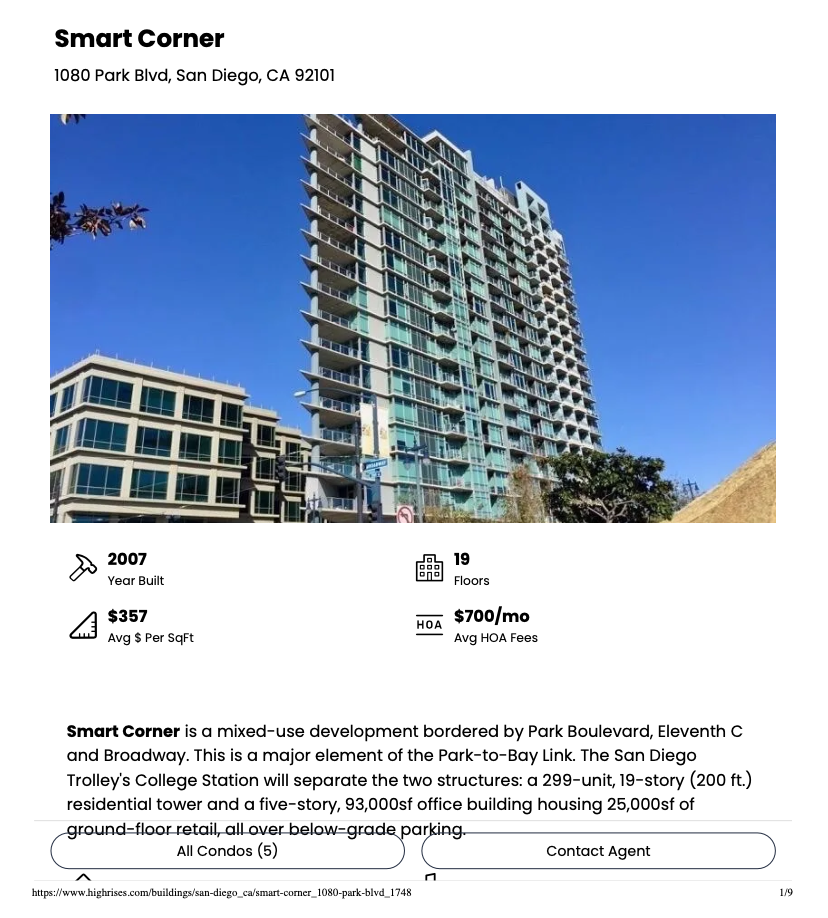
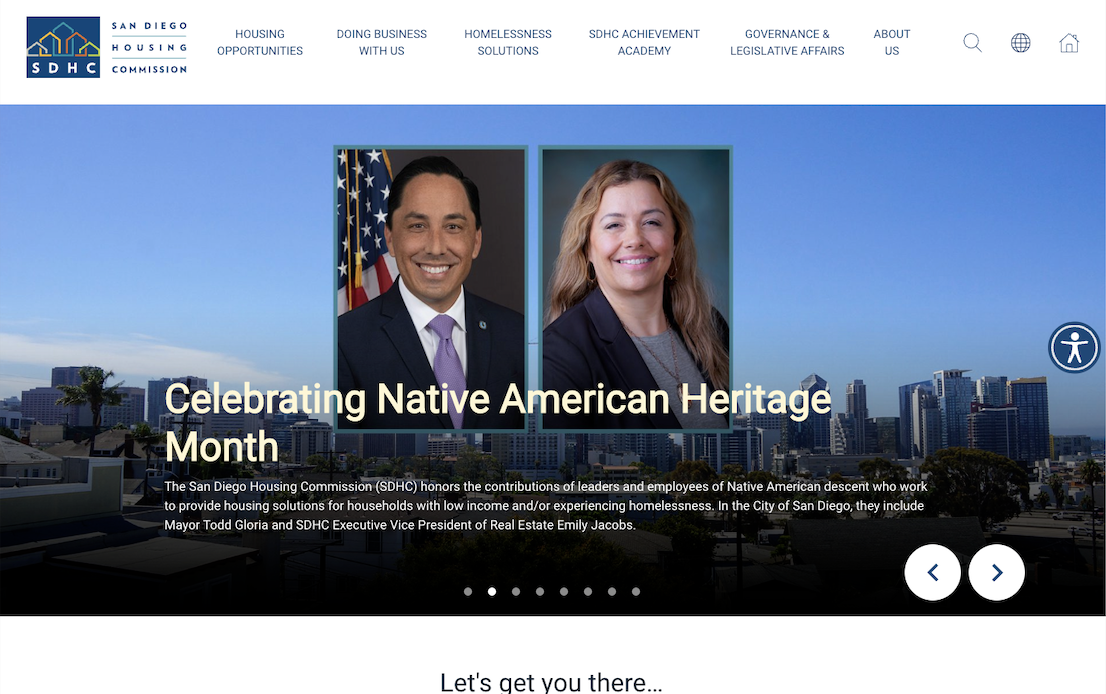

COMMISSIONER Ernest M, Gross
DEFENDANT: SMART CORNER OWNERS INC, AND ACE PARKING INC.
PHONY COMMISSIONER AND DISHONEST AND AMERICA, SAN DIEGO LAW
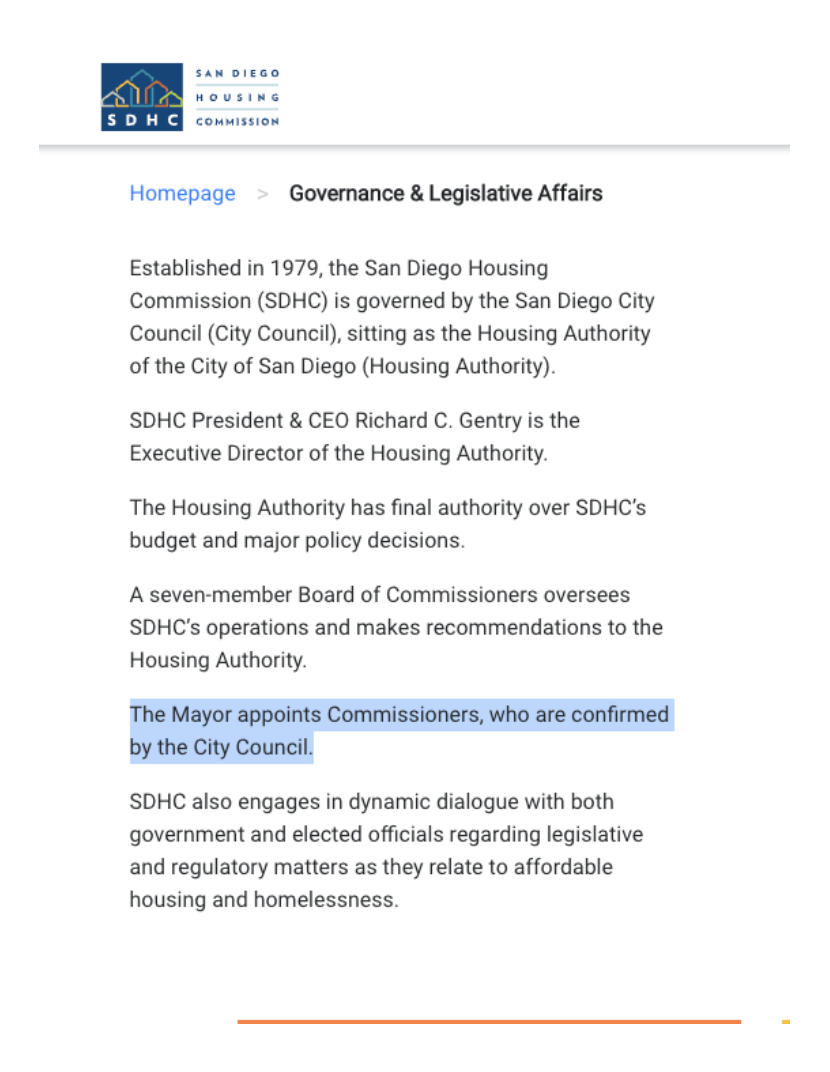
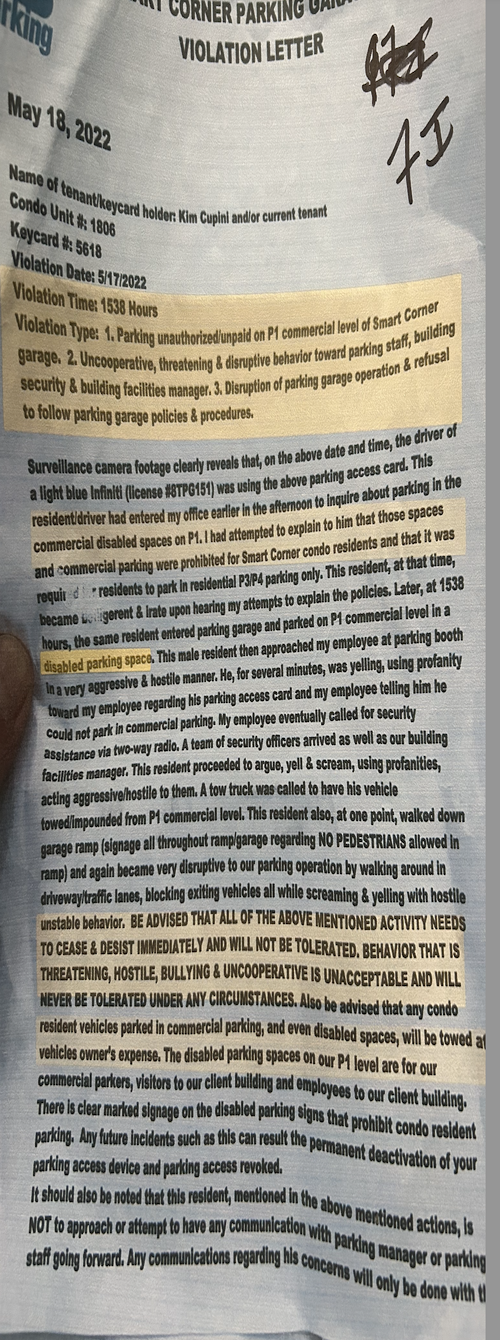
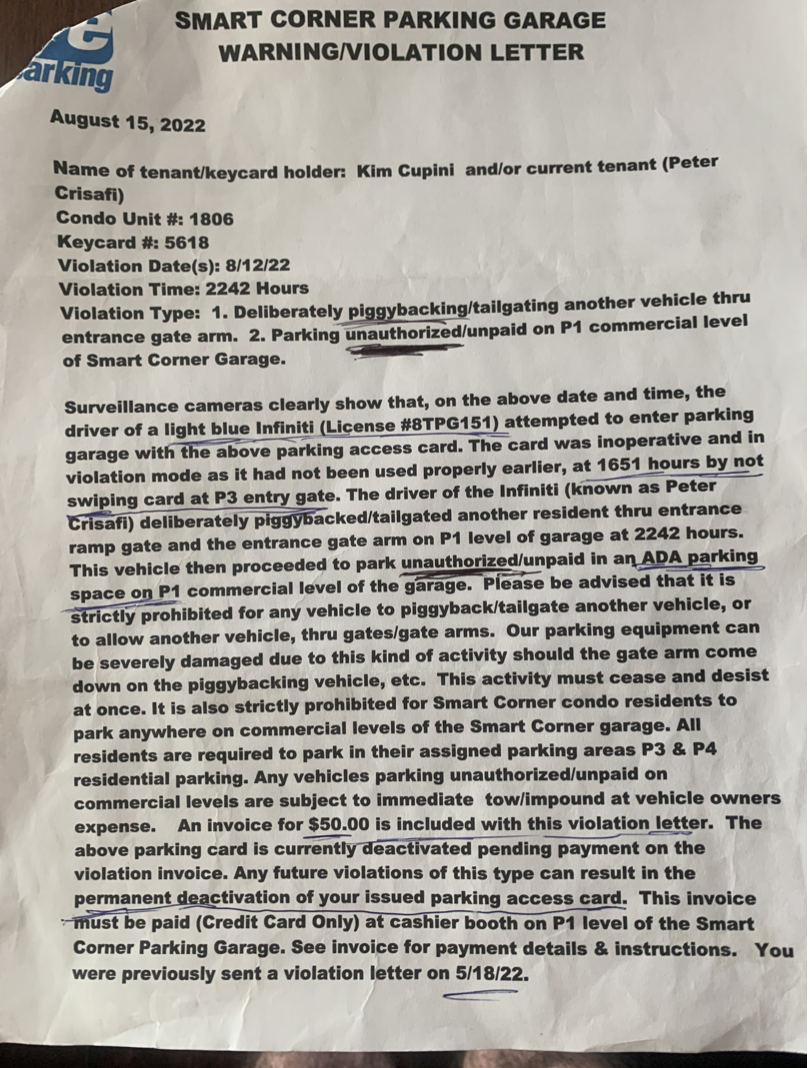
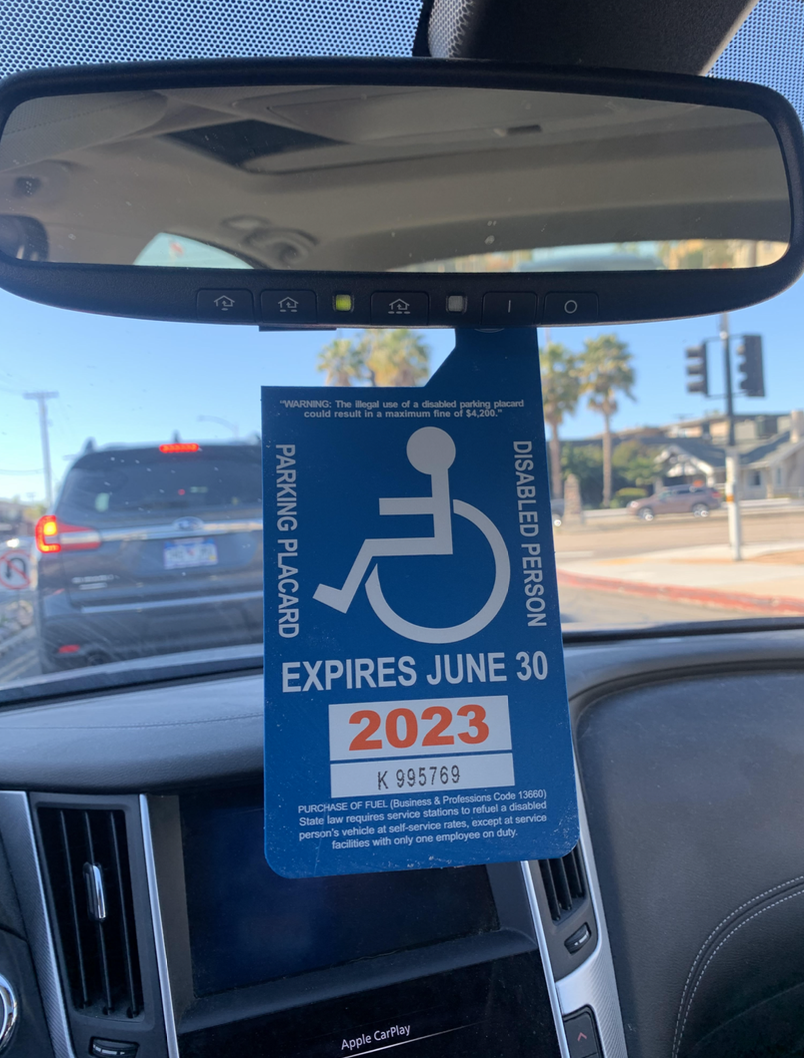
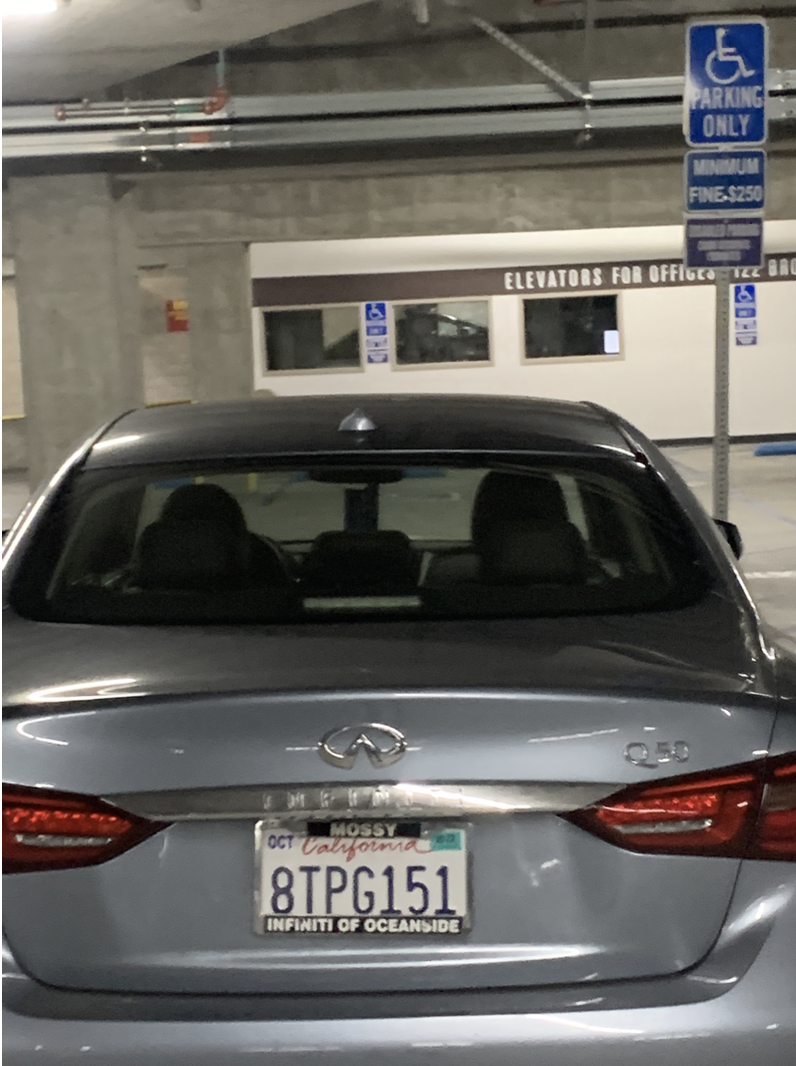
STATE OF CALIFORNIA
VEHICLE CODE SECTION 22658
ARTICLE 1. Authority to Remove Vehicles [22650 - 22711] ( Article 1 enacted by Stats. 1959, Ch. 3. )
22658.
(a) The owner or person in lawful possession of private property, including an association of a common interest development, as defined in Sections 4080 and 4100 or Sections 6528 and 6534 of the Civil Code, may cause the removal of a vehicle parked on the property to a storage facility that meets the requirements of subdivision (n) under any of the following circumstances:
(1) There is displayed, in plain view at all entrances to the property, a sign not less than 17 inches by 22 inches in size, with lettering not less than one inch in height, prohibiting public parking (SDHC BUDGET AND SAN DIEGO MAYOR Todd Gloria HIRES COMMISION SDHC) and indicating that vehicles will be removed at the owner’s expense, and containing the telephone number of the local traffic law enforcement agency and the name and telephone number of each towing company that is a party to a written general towing authorization agreement with the owner or person in lawful possession of the property. The sign may also indicate that a citation may also be issued for the violation.
(2) The vehicle has been issued a notice of parking violation, and 96 hours have elapsed since the issuance of that notice.
(3) The vehicle is on private property and lacks an engine, transmission, wheels, tires, doors, windshield, or any other major part or equipment necessary to operate safely on the highways, the owner or person in lawful possession of the private property has notified the local traffic law enforcement agency, and 24 hours have elapsed since that notification.
(4) The lot or parcel upon which the vehicle is parked is improved with a single-family dwelling.
(b) The tow truck operator removing the vehicle, if the operator knows or is able to ascertain from the property owner, person in lawful possession of the property, or the registration records of the Department of Motor Vehicles the name and address of the registered and legal owner of the vehicle, shall immediately give, or cause to be given, notice in writing to the registered and legal owner of the fact of the removal, the grounds for the removal, and indicate the place to which the vehicle has been removed. If the vehicle is stored in a storage facility, a copy of the notice shall be given to the proprietor of the storage facility. The notice provided for in this section shall include the amount of mileage on the vehicle at the time of removal, if the vehicle has a visible odometer, and the time of the removal from the property. If the tow truck operator does not know and is not able to ascertain the name of the owner or for any other reason is unable to give the notice to the owner as provided in this section, the tow truck operator shall comply with the requirements of subdivision (c) of Section 22853 relating to notice in the same manner as applicable to an officer removing a vehicle from private property.
(c) This section does not limit or affect any right or remedy that the owner or person in lawful possession of private property may have by virtue of other provisions of law authorizing the removal of a vehicle parked upon private property.
(d) The owner of a vehicle removed from private property pursuant to subdivision (a) may recover for any damage to the vehicle resulting from any intentional or negligent act of a person causing the removal of, or removing, the vehicle.
(e) (1) An owner or person in lawful possession of private property, or an association of a common interest development, causing the removal of a vehicle parked on that property is liable for double the storage or towing charges whenever there has been a failure to comply with paragraph (1), (2), or (3) of subdivision (a) or to state the grounds for the removal of the vehicle if requested by the legal or registered owner of the vehicle as required by subdivision (f).
(2) A property owner or owner’s agent or lessee who causes the removal of a vehicle parked on that property pursuant to the exemption set forth in subparagraph (A) of paragraph (1) of subdivision (l) and fails to comply with that subdivision is guilty of an infraction, punishable by a fine of one thousand dollars ($1,000).
(f) An owner or person in lawful possession of private property, or an association of a common interest development, causing the removal of a vehicle parked on that property shall notify by telephone or, if impractical, by the most expeditious means available, the local traffic law enforcement agency within one hour after authorizing the tow. An owner or person in lawful possession of private property, an association of a common interest development, causing the removal of a vehicle parked on that property, or the tow truck operator who removes the vehicle, shall state the grounds for the removal of the vehicle if requested by the legal or registered owner of that vehicle. A towing company that removes a vehicle from private property in compliance with subdivision (l) is not responsible in a situation relating to the validity of the removal. A towing company that removes the vehicle under this section shall be responsible for the following:
(1) Damage to the vehicle in the transit and subsequent storage of the vehicle.
(2) The removal of a vehicle other than the vehicle specified by the owner or other person in lawful possession of the private property.
(g) (1) (A) Possession of a vehicle under this section shall be deemed to arise when a vehicle is removed from private property and is in transit.
(B) Upon the request of the owner of the vehicle or that owner’s agent, the towing company or its driver shall immediately and unconditionally release a vehicle that is not yet removed from the private property and in transit.
(C) A person failing to comply with subparagraph (B) is guilty of a misdemeanor.
(2) If a vehicle is released to a person in compliance with subparagraph (B) of paragraph (1), the vehicle owner or authorized agent shall immediately move that vehicle to a lawful location.
(B) A towing operator shall make available for inspection and copying their rate approved by the Department of the California Highway Patrol, if any, within 24 hours of a request without a warrant to law enforcement, the Attorney General, district attorney, or city attorney.
(2) If a vehicle is released within 24 hours from the time the vehicle is brought into the storage facility, regardless of the calendar date, the storage charge shall be for only one day. Not more than one day’s storage charge may be required for a vehicle released the same day that it is stored.
(l) (1) (A) A towing company shall not remove or commence the removal of a vehicle from private property without first obtaining the written authorization from the property owner or lessee, including an association of a common interest development, or an employee or agent thereof, who shall be present at the time of removal and verify the alleged violation, except that presence and verification is not required if the person authorizing the tow is the property owner, or the owner’s agent who is not a tow operator, of a residential rental property of 15 or fewer units that does not have an onsite owner, owner’s agent or employee, and the tenant has verified the violation, requested the tow from that tenant’s assigned parking space, and provided a signed request or email, or has called and provides a signed request or email within 24 hours, to the property owner or owner’s agent, which the owner or agent shall provide to the towing company within 48 hours of authorizing the tow. The signed request or email shall contain the name and address of the tenant, and the date and time the tenant requested the tow. A towing company shall obtain, within 48 hours of receiving the written authorization to tow, a copy of a tenant request required pursuant to this subparagraph. For the purpose of this subparagraph, a person providing the written authorization who is required to be present on the private property at the time of the tow does not have to be physically present at the specified location of where the vehicle to be removed is located on the private property.
(B) The written authorization under subparagraph (A) shall include all of the following:
(i) The make, model, vehicle identification number, and license plate number of the removed vehicle. If the vehicle is a shared mobility device or does not have an identifiable make, model, vehicle identification number, or license plate number, the authorization shall include any identification numbers on the vehicle, including, but not limited to, a quick response (QR) code or serial number.
(ii) The name, signature, job title, residential or business address, and working telephone number of the person, described in subparagraph (A), authorizing the removal of the vehicle.
(iii) The grounds for the removal of the vehicle.
(iv) The time when the vehicle was first observed parked at the private property.
(v) The time that authorization to tow the vehicle was given.
(C) (i) When the vehicle owner or their agent claims the vehicle, the towing company prior to payment of a towing or storage charge shall provide a photocopy of the written authorization to the vehicle owner or the agent.
(3) A towing company shall maintain the original written authorization, or the general authorization described in subparagraph (E) of paragraph (1) and the photograph of the violation, required pursuant to this section, and any written requests from a tenant to the property owner or owner’s agent required by subparagraph (A) of paragraph (1), for a period of three years and shall make them available for inspection and copying within 24 hours of a request without a warrant to law enforcement, the Attorney General, district attorney, or city attorney.
(4) A person who violates this subdivision is guilty of a misdemeanor, punishable by a fine of not more than two thousand five hundred dollars ($2,500), or by imprisonment in a county jail for not more than three months, or by both that fine and imprisonment.
(5) A person who violates this subdivision is civilly liable to the owner of the vehicle or their agent for four times the amount of the towing and storage charges.
(m) (1) A towing company that removes a vehicle from private property under this section shall notify the local law enforcement agency of that tow after the vehicle is removed from the private property and is in transit.
(2) A towing company is guilty of a misdemeanor if the towing company fails to provide the notification required under paragraph (1) within 60 minutes after the vehicle is removed from the private property and is in transit or 15 minutes after arriving at the storage facility, whichever time is less.
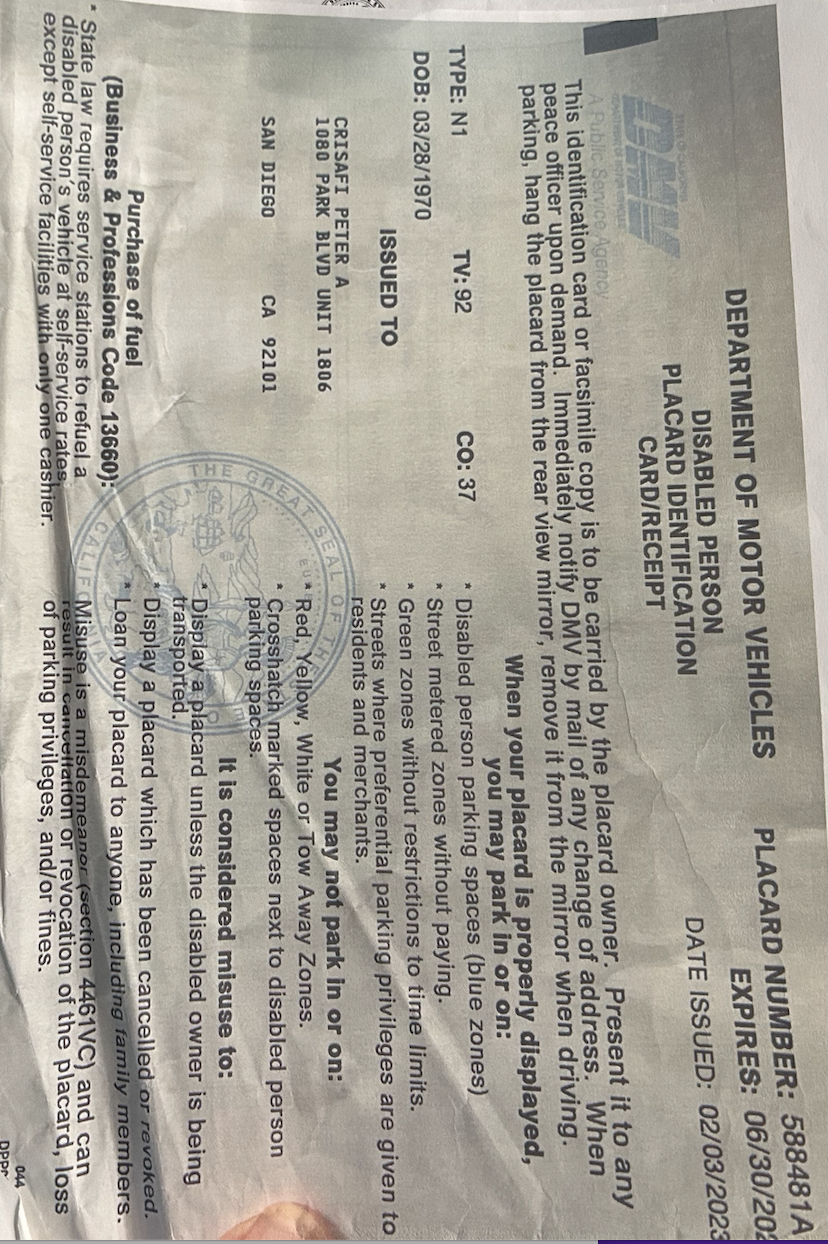
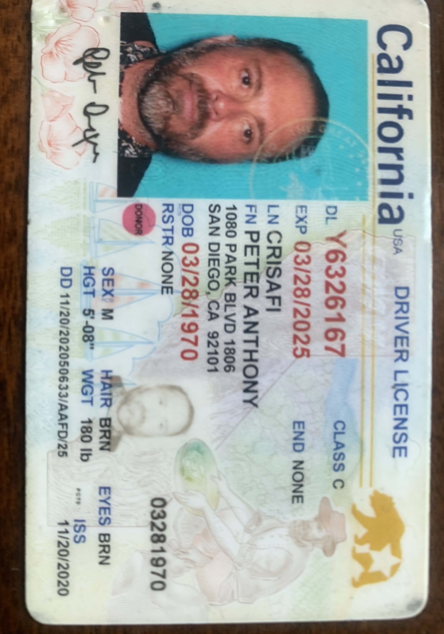
22511.8 (a) A local authority, by ordinance or resolution, and a person in lawful possession of an off street parking facility may designate stalls or spaces in an offstreet parking facility owned or operated by the local authority or person for the exclusive use of a vehicle that displays either a special license plate issued pursuant to Section 5007 or a distinguishing placard issued pursuant to Section 22511.55 or 22511.59. The designation shall be made by posting a sign as described in paragraph (1), and by either of the markings described in paragraph (2) or (3):
(1) (A) By posting immediately adjacent to, and visible from, each stall or space, a sign consisting of a profile view of a wheelchair with occupant in white on a blue background.
(c) If posted in accordance with subdivision (e) or (f), the owner or person in lawful possession of a privately owned or operated offstreet parking facility, after notifying the police or sheriff’s department, may cause the removal of a vehicle from a stall or space designated pursuant to subdivision (a) in the facility to the nearest public garage unless a special license plate issued pursuant to Section 5007 or distinguishing placard issued pursuant to Section 22511.55 or 22511.59 is displayed on the vehicle.
(d) If posted in accordance with subdivision (e), the local authority owning or operating an offstreet parking facility, after notifying the police or sheriff’s department, may cause the removal of a vehicle from a stall or space designated pursuant to subdivision (a) in the facility to the nearest public garage unless a special license plate issued pursuant to Section 5007 or a distinguishing placard issued pursuant to Section 22511.55 or 22511.59 is displayed on the vehicle.
(e) Except as provided in Section 22511.9, the posting required for an offstreet parking facility owned or operated either privately or by a local authority shall consist of a sign not less than 17 by 22 inches in size with lettering not less than one inch in height which clearly and conspicuously states the following: “Unauthorized vehicles parked in designated accessible spaces not displaying distinguishing placards or special license plates issued for persons with disabilities will be towed away at the owner’s expense. Towed vehicles may be reclaimed at:
g) This section does not restrict the privilege granted to disabled persons and disabled veterans by Section 22511.5.
(Amended by Stats. 2009, Ch. 200, Sec. 14. (SB 734) Effective January 1, 2010.)
STATE OF CALIFORNIA CODE VEHICLE 22511.5
(1) A disabled person or disabled veteran displaying special license plates issued under Section 5007 or a distinguishing placard issued under Section 22511.55 or 22511.59 is allowed to park for unlimited periods in any of the following zones:
(A) In any restricted zone described in paragraph (5) of subdivision (a) of Section 21458 or on streets upon which preferential parking privileges and height limits have been given pursuant to Section 22507.
(B) In any parking zone that is restricted as to the length of time parking is permitted as indicated by a sign erected pursuant to a local ordinance.
(2) A disabled person or disabled veteran is allowed to park in any metered parking space without being required to pay parking meter fees.
(3) This subdivision does not apply to a zone for which state law or ordinance absolutely prohibits stopping, parking, or standing of all vehicles, or which the law or ordinance reserves for special types of vehicles, or to the parking of a vehicle that is involved in the operation of a street vending business.
(b) A disabled person or disabled veteran is allowed to park a motor vehicle displaying a special disabled person license plate or placard issued by a foreign jurisdiction with the same parking privileges authorized in this code for any motor vehicle displaying a special license plate or a distinguishing placard issued by the Department of Motor Vehicles.
Ca. Veh. Code § 22511.5
STATE CODE 22507.8
a) It is unlawful for any person to park or leave standing any vehicle in a stall or space designated for disabled persons and disabled veterans pursuant to Section 22511.7 or 22511.8of this code or Section 14679 of the Government Code, unless the vehicle displays either a special identification license plate issued pursuant to Section 5007 or a distinguishing placard issued pursuant to Section 22511.55 or 22511.59.
(b) It is unlawful for any person to obstruct, block, or otherwise bar access to those parking stalls or spaces except as provided in subdivision (a).
(c) It is unlawful for any person to park or leave standing any vehicle, including a vehicle displaying a special identification license plate issued pursuant to Section 5007 or a distinguishing placard issued pursuant to Section 22511.55 or 22511.59, in either of the following places:
(1) On the lines marking the boundaries of a parking stall or space designated for disabled persons or disabled veterans.
(2) In any area of the pavement adjacent to a parking stall or space designated for disabled persons or disabled veterans that is marked by crosshatched lines and is thereby designated, pursuant to any local ordinance, for the loading and unloading of vehicles parked in the stall or space.
(d) Subdivisions (a), (b), and (c) apply to all offstreet parking facilities owned or operated by the state, and to all offstreet parking facilities owned or operated by a local authority. Subdivisions (a), (b), and (c) also apply to any privately owned and maintained offstreet parking facility.

§ 22651 CVC – California Impound & Towing Laws. § 22651 CVC is the California law authorizing automobiles
22651 CVC allows for nine main circumstances where local authorities may initiate the removal of vehicles by a tow truck:
1. Parking in handicapped spots without proper plates or tags. Disabled parking is very limited in most public parking lots. Simply ticketing the car does not create more space for disabled drivers. So traffic officers often elect to tow these cars.
2. The driver is arrested. This typically occurs following: A DUI. Drag racing (23109 VC). Or traffic stops where police see contraband in the
1. car or find an active warrant for the driver.
2. Blocked flow of traffic. This is when a parked car obstructs the free flow of traffic. Or presents a safety risk.2
3. Car accident. The person driving may be hospitalized. Or otherwise too injured or incapacitated to drive.3
No registration. Even legally parked cars can get towed for: Missing license plates. No registration. Registration that was more than six (6) months expired. Or fake or forged vehicle registration and/or plates.4.
1. No license. When a driver of the vehicle gets caught driving without a valid driver’s license (12500 VC) or driving on a suspended license (14601.1(a)).5
2. Debt collection for past parking tickets. Even a lawfully parked automobile can get towed if: The owner has at least five unpaid parking citations. Or the owner failed to pay a municipal garage parking fee.6
3. 72-hour ordinance. Some local laws require automobiles to be towed that are left parked for at least 72 consecutive hours.7
4. Unlicensed car dealers. Cars being offered for sale by an unlicensed dealer get towed.8
The majority of parking violations do not result in vehicle towing. But drivers have to make sure to take care of their tickets. As discussed above, racking up five or more unpaid tickets gives law enforcement the legal authorization for impounding the automobile.

CALIFORNIA VEHICLE CODE
The California Department of Motor Vehicles website seems to indicate that anyone with a disabled placard or license plate may park in any designated disabled space. It does not appear to make a distinction between public and private property or between reserved and unreserved spaces. This creates a potential problem for landlords who may assign a disabled space in their “resident-only” parking areas to a particular resident who has disabilities and then discover that another resident who has a valid disabled placard or license plate is parking in that “reserved” space.
The “violating” resident may argue that the disabled placard or license plate gives him/her the right to park in any disabled parking space. Complicating matters, landlords may find that their towing companies are unwilling to tow a person with a valid disabled placard or license plate out of such a space, notwithstanding the fact that it is reserved for use by another resident who has disabilities. When assigning a disabled parking space to a resident with disabilities, landlords would be well advised to advise the resident of this possibility (preferably in writing). If it becomes a problem, work with one or both residents to see if there is a reasonable accommodation (as described below) that would address the problem.

DISABILITY ACCOMMODATIONS FOR RESIDENTS
Federal and California fair housing laws require that landlords make “reasonable
accommodations” (exceptions to the rules, policies, procedures and services of the community) for residents with disabilities. The reservation of a space that is close to the resident’s unit is generally considered to be reasonable. The expense and effort of the reservation of the space is often minimal and usually borne by the landlord.
The request from the person and its approval or denial should be processed in accordance with fair housing guidelines. Please see our resource library at www.kts-law.com for information on proper conformance with current rules.
If the property has no reserved parking spaces, a space would be reserved pursuant to the resident’s request, as an exception to the rules. Note that if other residents ask why someone was given a reserved space, the confidentiality of the person with the disability must be maintained. An owner or manager should just indicate that although the reason for the reservation cannot be disclosed, the action was taken in compliance with the law. If the party questioning the action files a discrimination complaint, the documentation regarding the accommodation should support the reasonableness of the landlord’s position.
If all of the spaces on a property are assigned to residents, making a reasonable accommodation can be very challenging. Other residents can be asked to trade spaces voluntarily…without disclosing the reason. If no one will cooperate, you may need to explore other alternatives (as outlined below).
If the person needs a wider space or a van-accessible space, you may need to assign the person two side-by-side spaces and have them striped like a van-accessible space, but using white paint instead of blue and without the wheelchair symbol or disabled parking signage. A sign should be installed indicating: “Reserved – Violators Will Be Towed.” As long as your parking lot has the other required signage prohibiting public parking and stating that unauthorized vehicles will be towed, you should be able to have a violator towed out of the resident’s reserved parking space.
When a request for accommodation is considered to be unreasonable or impossible, the landlord should attempt to negotiate an alternative accommodation. In the case of parking, if the resident can wait and is willing to do so, he or she can be put on the waiting list for parking (ahead of any non-disability-related parking request). If he or she cannot wait for the next available space which would suit his or her needs, the resident should be offered an opportunity to terminate the tenancy without penalty.
Residents often think that they should be able to use public ADA parking spaces on a regular basis. However, such spaces must be available on a first come, first served basis for members of the public who come to the property to transact business. They can’t be assigned to anyone, but as outlined above, it is likely not legal to tow a resident out of such a space if he/she has a valid disabled placard or license plate. Instead, offer an opportunity for a reasonable accommodation as described above. It is important that there be written documentation of such interactions.
www.sandiegocounty.gov
ORDINANCE NO. 10251
6755 ACCESSIBLE PARKING REQUIREMENTS.
The Americans with Disabilities Act (ADA) governs the construction and alteration of public places, commercial facilities, and state and local government facilities to accommodate and places, commercial facilities, and state and local government facilities to accommodate and to the requirements of the California Building Code (Chapter 11 B) for Accessible Parking standards as found in Title 24 of the California Code of Regulations.
Homeowners Have a Right to Change HOA Rules and Regulations. It is within homeowners legal rights to change the association's rules and regulations. Homeowners can choose to take action if they deem certain rules as unfair, outdated, or discriminatory. The HOA board cannot stop them.
We want to make the confusion a little clearer and give you some definitive answers to questions like can HOA rules override state law?
-
Discrimination: The FHA prohibits discrimination in housing. Hence, an HOA cannot discriminate against homeowners based on their color, disability, familial status, national origin, race, religion and sex. It’s worth mentioning that some states have expanded the list of protected classes. For instance, in California, they have laws that prevent discrimination on the basis of someone’s gender identity
https://www.fsresidential.com/delaware/news-events/articles/unenforceable-hoa-rules/
Unenforceable HOA rules are those that are against the law. Just because the HOA governs a community, they are not above the law – and still need to abide by it. That means any laws or enforcements they try to make must be legal. Yet, still, unenforceable HOA rules get enforced all the time
HOA rules cannot override state or federal laws,
Disability, or handicap, parking permits allow individuals with walking difficulties to park in specially designated spaces near the entrance of businesses. Although this makes activities possible, harassment may be experienced due to the permit. Oftentimes, an assumption is made that those using disabled parking spaces must be wheelchair-bound or have a visible disability, otherwise, they are faking. This assumption can lead to harassment.
______________ ETHICAL MISCONDUCT DEMEANOR CALIFORNIA LAWS
Rule 8.4 Misconduct
Engage in conduct that is prejudicial to the administration of justice ,
Bias/Appearance of Bias Toward a Particular Class, Demeanor/Decorum, On-Bench Abuse of Authority in Performance of Judicial Duties
COMMISSIONER Ernest M, Gross https://cjp.ca.gov/file_a_complaint/____________
NEW TRIAL
California Rules of Court Rule 10.745
FEBRUARY/23/2023
CASE NUMBER 22SC1630C
Dept. 63
TRIAL : JUDGE Mark Abumeri
PLAINTIFF: PETER CRISAFI VS DEFENDANT: SMART CORNER OWNERS INC,
CLAIM: UNLAWFULLY TOWED HANDICAPPED CAR AND HARASSMENT HANDICAPPED PARKING Disability, or handicap, parking permits
If harassment occurs, individuals can choose to ignore it, knowing that the person harassing lacks understanding.
JUDGE Mark Abumeri -DISMASA, read paper , Common Statue of California Small Court, NOTHING read paper and COMMISSIONER Ernest M, Gross is the court and paper sign Disability Accommodation Request Denied.

JUDGE Mark Abumeri
ETHICAL MISCONDUCT DEMEANOR CALIFORNIA LAWS
Rule 8.4 Misconduct
Engage in conduct that is prejudicial to the administration of justice .
Bias/Appearance of Bias Toward a Particular Class
https://cjp.ca.gov/file_a_complaint/

2023 California Rules of Court
California Rules of Court Rule 10.745
Rule 10.745. Performance
(a) Review required
The court must review on a regular basis the performance of temporary judges appointed by that court.
(b) Monitoring performance
In monitoring and reviewing the performance of court-appointed temporary judges, the court may use direct observation, audiotaping of hearings, reports by court staff, comments from mentor judges, and such other means as may be helpful.
Rule 10.745 renumbered effective January 1, 2007; adopted as rule 6.745 effective July 1, 2006.
(a) Review required
The court must review on a regular basis the performance of temporary judges appointed by that court.
(b) Monitoring performance
In monitoring and reviewing the performance of court-appointed temporary judges, the court may use direct observation, audiotaping of hearings, reports by court staff, comments from mentor judges, and such other means as may be helpful.
Rule 10.745 renumbered effective January 1, 2007; adopted as rule 6.745 effective July 1, 2006.
SMALL CLAIMS APPEAL IS NEW TRIAL WITH DIFFERENT JUDGE
Do not wait to file your California small claims court lawsuit. After an incident occurs, you only have a set period of time to file your lawsuit. Think of this as a deadline (called the statute of limitations). Once the deadline is reached, you may not be able to win in small claims court. The majority of statutes of limitations affecting California small claims are between 2-4 years.
Need California small claims assistance? People Clerk can help.
What is the Statute of Limitations?
The California legislature sets deadlines (called the statute of limitations) for when a lawsuit can be filed. In California, there isn’t a difference between the statute of limitations for a small claims lawsuit versus for a lawsuit filed in regular civil court. Instead, there is a different statute of limitations period for different types of legal claims. For example, if you were in a car accident and someone damaged your car, there would be a different statute of limitations than if you were suing someone for not paying you back after you lent them money.
Common Statute of Limitations for California Small Claims Court.
State Bar of California
845. S. Figueroa Street
Los Angeles CA 90017
https://www.calbar.ca.gov/
213-765-1000
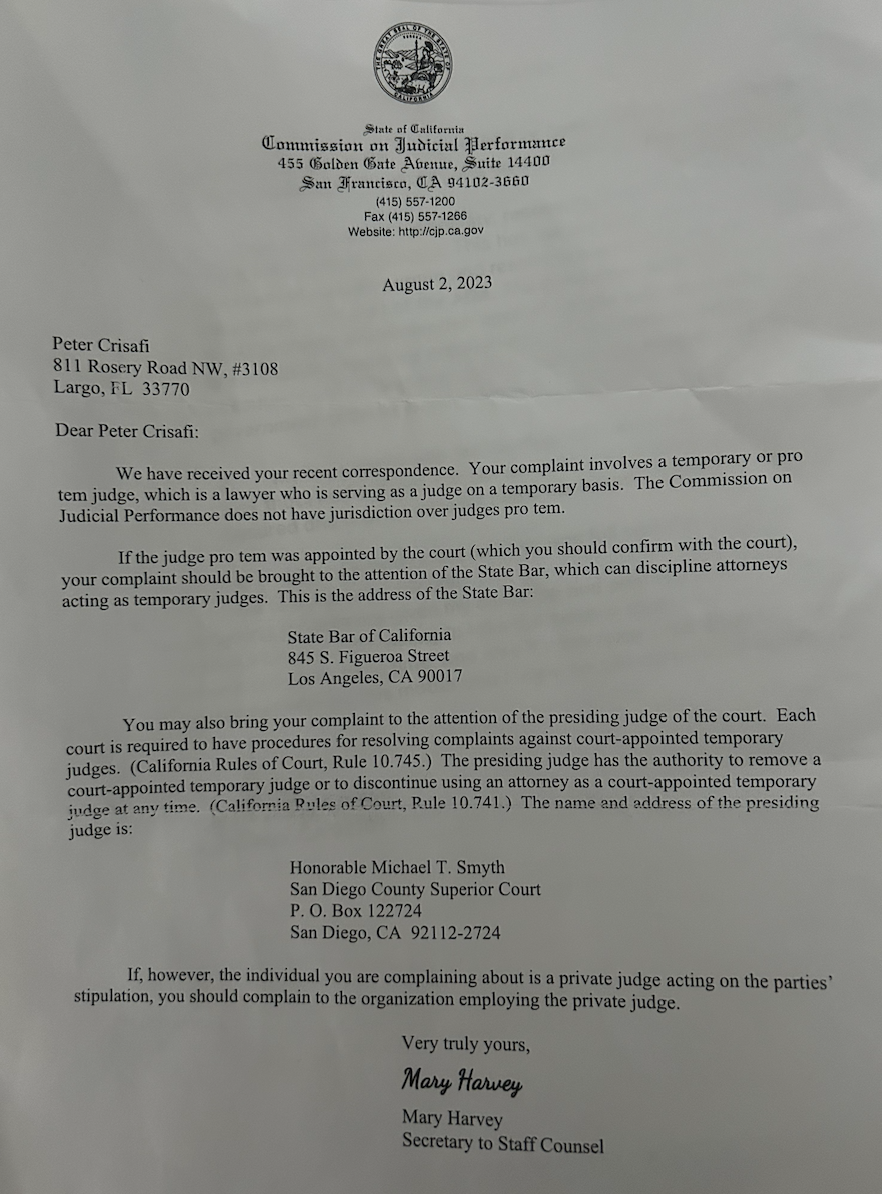
State Bar of California 8
45. S. Figueroa Street
Los Angeles CA 90017
https://www.calbar.ca.gov/
213-765-1000
https://cjp.ca.gov/file_a_complaint/
Honorable Michael T Smyth
San Diego County ,Superior Court
P.O Box 122724
San Diego CA 92101
(415) 557-1266.
COMMISSION ON JUDICIAL PERFORMANCE
455 Golden Gate Avenue, Suite 14400
San Francisco, California 94102
https://cjp.ca.gov/file_a_complaint/
Office of the Mayor of San Diego
Civic Ctr Wy, San Diego, CA 92101
(619) 236-6330
California Department Of Fair Housing
https://calcivilrights.ca.gov/housing/
800-884-1684 (voice), 800-700-2320 (TTY) or California’s Relay Service at 711
Email contact.center@calcivilrights.ca.gov
- 2218 Kausen Drive, Suite 100
Elk Grove, CA 95758
Smart Corner
FirstService Residential
https://www.fsresidential.com/california/offices/san-diego/
Smart Corner Owners Association is a 20-story contemporary high-rise located in downtown San Diego. The 301-unit high-rise is located
(800) 428-5588
Nerissa Damasco CMCA
Genaral Manger
FirstService Residential - San Diego,

